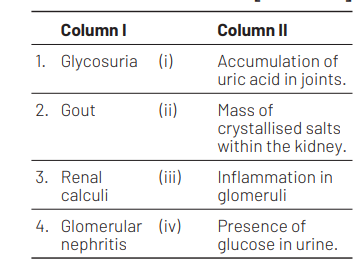Question
Presence of which of the following conditions in urine are indicative of diabetes mellitus? [NEET (Sep.) 2020]
(a) Uremia and Renal calculi
(b) Ketonuria and Glycosuria
(c) Renal calculi and Hyperglycaemia
(d) Uremia and Ketonuria
Answer/Explanation
Ans. (b)
Presence of glucose (glycosuria) and ketone bodies (ketonuria) in urine are indicative of diabetes mellitus. In diabetes mellitus the body produces excess ketones as an indication that it is using an alternative source of energy. It is seen more commonly in type 1 diabetes mellitus. Presence of glucose indicates Type If diabetes. In some cases, insulin cannot transport blood sugar into the bodys cells effectively. This can also cause blood sugar to be passed out in urine.
Question
Which of the following would help in prevention of diuresis? [NEET (Sep.) 2020]
(a) Reabsorption of $\mathrm{Na}^{+}$and water from renal tubules due to aldosterone
(b) Atrial natriuretic factor causes vasoconstriction
(c) Decrease in the secretion of renin by JG cells
(d) More water reabsorption due to undersecretion of $A D H$
Answer/Explanation
Ans. (a)
Adrenal cortex secretes mineralocorticoids, i.e. aldosterone which increase the reabsorption of $\mathrm{Na}^{+}$ and water from renal tubule thereby preventing diuresis.
Question
Use of an artificial kidney during hemodialysis may result in : [NEET (National) 2019]
A. Nitrogenous waste build-up in the body
B. Non-elimination of excess potassium ions
C. Reduced absorption of calcium ions from gastrointestinal tract
D. Reduced RBC production
Which of the following options is the most appropriate?
(a) (B) and $(C)$ are correct
(b)(C) and (D) are correct
(c) (A) and (D) are correct
(d)(A) and (B) are correct.
Answer/Explanation
Ans. (b)
Statements (C) and (D) are correct. Use of an artificial kidney during haemodialysis may result in reduced RBC production and reduced absorption of calcium ions from gastrointestinal tract. The former would occur due to the low level of erythropoietin hormone secreted by juxtaglomerular cells. The later would be caused due to the elimination of calcium ions along with phosphate ions during dialysis. Statements (A) and (B) are incorrect because dialysis helps in the removal of nitrogenous waste and potassium ions from the body.
Question.
Match the items given in Column I with those in Column II and select the correct option given below [NEET 2018]

1 2 3 4
(a) (ii) (iii) (i) (iv)
(b) (i) (ii) (iii) (iv)
(c) (iii) (i) (iv) (i)
(d) (iv) (i) (ii) (iii)
Answer/Explanation
Ans. (d)
Increased level of glucose in blood which may be caused due to untreated diabetes mellitus results in glycosuria. In this condition, glucose is present in the urine.
Gout is a form of arthritis characterised by severe pain and tenderness in joints. It is caused due to the accumulation of uric acid crystals in joints.
Renal calculi or kidney stones are small masses of crystalline salts within the kidneys. These stones can be of calcium, uric acid, struvite (magnesium ammonium phosphate), etc.
Glomerular nephritis is the inflammation of filtering unit, i.e. glomerulus of kidney. It is also known as Bright’s disease. It may cause haematuria (blood in urine) and proteinuria (proteins in blood).
Question
A condition of failure of kidney to form urine is called [CBSE AIPMT 1998]
(a) deamination
(b) entropy
(c) anuria
(d) None of these
Answer/Explanation
Ans. (c)
The terms anuria, oligonuria, polynuria and dysuria are used for absence of urine, scanty urine, large amounts of urine and painful urination respectively. Deamination is the removal of an amino $\left(-\mathrm{NH}_2\right)$ group frequently from an amino acid by transaminase enzymes.
Question
If kidneys fail to reabsorb water, the effect on tissue would [CBSE AIPMT 1994]
(a) remain unaffected
(b) shrink and shrivel
(c) absorb water from blood plasma
(d) take more $_2$ from blood
Answer/Explanation
Ans. (b)
If kidney fails to reabsorb water the concentration of urine will be low and urination will be more frequent, a condition called polyuria as a result, the tissues of the body will be dehydrated and shrink.
